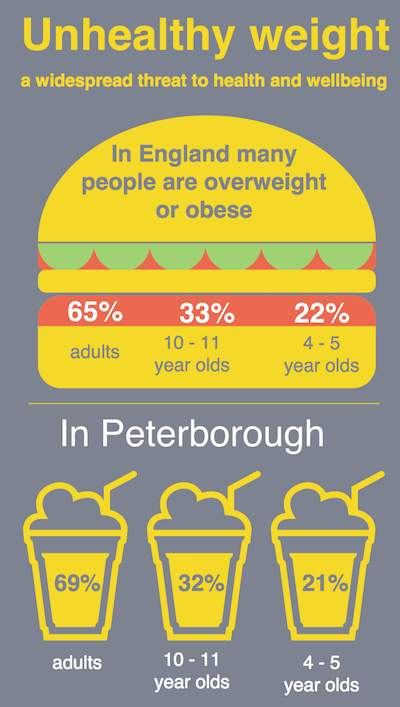One of Peterborough’s most senior doctors has used his position on the Cambridgeshire and Peterborough Clinical Commissioning Group to speak against the ease of access to takeaways, fast food, and alcohol in the city. General Practitioner Harshad Mistry, who represents Peterborough GPs, suggested that by permitting these establishments councillors and public health officials were sending a message to the public saying it is OK to use them.
Dr Mistry was commenting on the Peterborough Annual Public Health report, a document aimed at the general public, designed to encourage people to change their behaviours to improve their health. The report stated the Director of Public health is:
Addressing attitudes, beliefs and behaviours towards diet
The Director of Public Health, Liz Robin, revealed that councillors do seek her comments from a public health perspective before regulatory decisions on matters such as licences to sell alcohol are taken.

I have transcribed the rather garbled exchange which took place at the Cambridgeshire and Peterborough Clinical Commissioning Group Governing Body Meeting on the 13th of September 2016:
Harshad Mistry (GP) : One of my main concerns is that with respect to public health and local politics, when I walk down Lincoln Road within a half mile stretch there are lots of takeaways, lots of fast food stalls, and lots of off-licences and they’re near schools as well and we don’t have a co-ordinated policy for granting licences for off-licences and takeaway food stores which part of the report does say about whether we’re living [healthy] lifestyles and we’re not doing anything to promote them, that aspect, the more you see these takeaways, the more you see these off-licences, in a way we’re giving a licence to the public we’re sort of saying it’s OK to use them because we’ve approved them.
Liz Robin (Director of Public Health for Cambridgeshire & Peterborough) : Thank you “H”. You’re absolutely making a very good point there. There are clearly limitations to what local authorities can do under current legislation. We do have what’s called a cumulative impact zone in Lincoln Road which means there is an assumption that new alcohol licences should not be granted because there is already such a high density of outlets and there is potential issues under licensing so all applications in the cumulative impact zone, it doesn’t cover the whole of Lincoln Road, but it does cover quite a lot of that area, the Can-Do area, those all come through for comment and they come through actually to me for comment from a public health perspective but also to other statutory consultees so there are some controls there but those are on new outlets
Around the fast food outlets I have to say that professionally I agree with you, the evidence base around that is growing, there is relatively little which can be done under current legislation there, some authorities have tried to prevent the opening of new fast food outlets near schools, I think that has been tested in courts but some local authorities are going that way, and we are certainly looking at those issues locally but there’s also a need to look nationally at what powers local authorities have and frankly there are also some very strong commercial interests with a lot of money behind them which will challenge individual local authorities if they try to push the boundaries and with the current state of public finances it can be very difficult for local authorities to find the legal fees to pilot a sort of very hard hitting approach nationally as if you go for it first you will probably get a challenge so it’s not easy but it’s a point very well made
Harshad Mistry (GP) : It is a confusing message for the public when we, as a public health body, we’re saying healthy eating and then the next the redevelopment of parts of the area we’re concerned about we’re putting in more fast foods and more alcohol.
One reason I view the exchange as garbled is it isn’t clear who Mistry is referring to by “we” when saying “we’ve approved them”. The Clinical Commissioning Group doesn’t determine licensing or planning applications.
My Views
I don’t want the choice of food outlets restricted on public health grounds.
Restricting the number of fast-food outlets or off-licences restricts competition, and could reduce choice and quality as well as raise prices.
I of course want to see people living happier and healthier lives, for their own sakes, and to reduce the costs to society of providing healthcare.
Educating people about the impact of dietary choices on their health (and consequently on costs to society should their choices result in them being a burden on others) is in my view the best approach.
We should certainly as a society try and protect children, but it’s hard to do that without undue interference by the state in people’s families. I think the threshold for intervention in a family should be very high, so again the primary route ought be education.
Education is not all that schools can do, I think it would be reasonable for schools to have rules banning pupils from purchasing food off the premises at lunch times for example. Planning and licensing restrictions preventing take-aways serving school pupils at lunchtimes and straight after school can in certain circumstances be reasonable.
I disagree with Dr Mistry’s suggestion people will assume things are OK because the state hasn’t banned them. People have to make their own judgements; and freedom to make your own choices, even if by others’ standards they’re bad choices, is important.
Imagine if the state took all your choices away and all you could eat was the state issued meal plan for the day. Even if that was undoubtedly the best option from a health perspective I’m sure I’d rebel against it